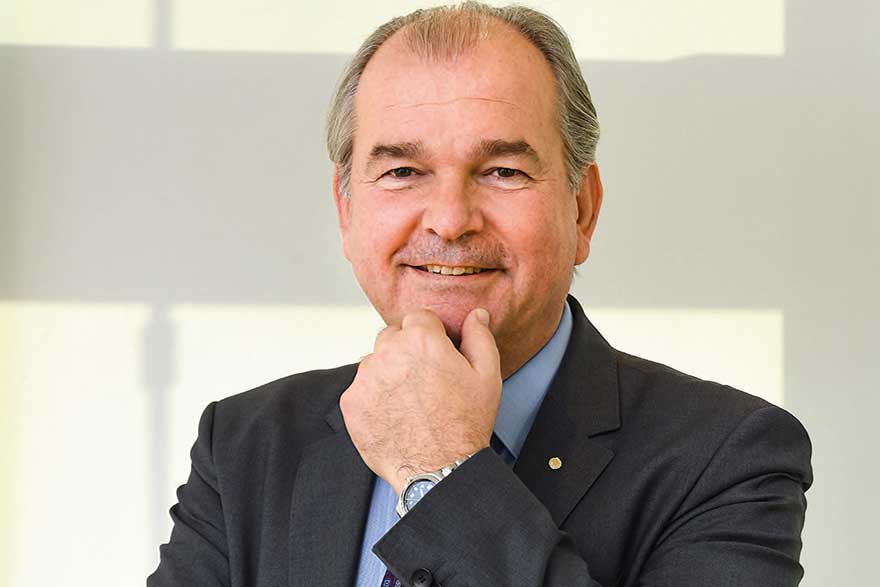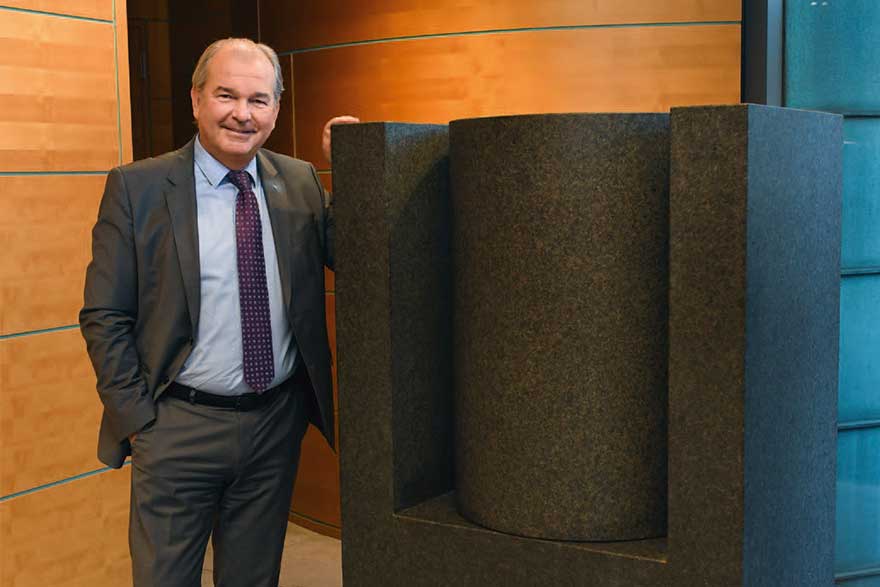Modern, innovative, multilateral – Sweden is a shining light on the international stage. Sweden’s Ambassador H.E. Per Thöresson talks about gender equality, climate action and explains what the Sweden Co-Lab is.
Ambassador, about four months after the elections, a formation of the government finally took place in mid-January. Stefan Löfven from the Social Democratic Workers Party was re-elected to be the prime minister. What goals does he have for his second term with respects to immigration policies, which have been the cause of great discussion in the past year?
The government is planning a comprehensive catalogue of measures in order to facilitate the integration of migrants. Employers who want to employ refugees or youths without school diplomas will be relieved of their social security contributions for two years. Furthermore, all newcomers to Sweden will participate in an integrational year consisting of skill-based language courses, internships, career training, political education, and a mentoring program. Supporting and promoting women is particularly important. They should have the same opportunities to establish themselves in Sweden and lead an independent life.
Recently the Swedish government has introduced an authority for women’s equality. Sweden is already considered a leader in this area. What goals does this institution have?
In Sweden, equality is a task that has long transcended a particular ministry and should instead be integrated in all political ministries and state authorities. That’s why, for the past five years, we’ve had a feminist government in Sweden. Our foreign policy is also decidedly feminist. Specifically, this means that equality must always be considered and be expressed everywhere, whether it’s in questions of staffing or in wealth distribution. The authority for gender equality is a relatively new development that will accompany, evaluate, and, where necessary, coordinate the integral implementation of this policy of equality. It supports and councils other authorities, communes, or representatives from the economy and society in questions of equality. It’s an important actor in fighting male violence toward women, violence in same-sex relationships, and so-called honour killings. It also supports the government in its international cooperation for more equality, which is in higher demand now.
Some of the cornerstones of Swedish foreign policy are the cooperation with the Arctic Council, which also includes Russia, Canada, and the USA. A key topic there is climate change, which has currently been drawing attention thanks to the Swedish 16-year-old Greta Thunberg, who talked about it at the World Economic Forum in Davos. What measures is your government taking in order to combat climate change?
No other country in Europe has been as ambitious in its climate goals and has implemented them as widely as Sweden has. This has been confirmed by last year’s ranking of the Climate Action Network Europe. We’ve already achieved the Europe-wide climate goals for 2030 in 2018. But the truth is that all of us — in Europe and worldwide — still need to do a lot in order to truly stop climate change. Therefore, the new government is planning a wide range of measures. The most important goal is promoting innovative climate-friendly technologies. This includes environmentally friendly modes of transportation, such as trains or public transport, or the development of fossil fuel-free power. In general, the transportation sector has to become more sustainable. Therefore subsidies for climate-friendly vehicles and for the return of climate-damaging vehicles will be increased. Throughout the whole country it should be possible to charge your electric car or fill up on fossil-free fuel. Starting in 2030, no more petrol or diesel-run cars will be available for purchase. Rail transport will also be heavily increased: with new high-speed rails and a uniform ticketing system for all of Sweden. The conservation and protection of our valuable nature is really important, and in Sweden we’re particularly worried about the oceans. We want to significantly minimise the use of fertiliser and pesticides, which end up affecting our water. Increased controls will also end illegal fishing, and the use of trawl nets will be forbidden in protected areas.
As a pro-European country, Sweden is particularly engaged in extending the European labour market as well as crossborder mobility. How will your government support that?
By continuing to fight for a EU for citizens. Sweden wants an EU that creates jobs and security for its citizens, that confidently steps up to the threat of climate change, and that improves its competitiveness in the global market. In a period of trade crises and growing nationalism, we have to be especially committed to free trade: we want to promote investments in Sweden and in other countries and join international trade agreements that are compatible with the protection of health and environment and protect workers’ rights.
This year, Sweden is the partner country of the Hannover Fair, which is a globally leading fair for industry and takes place from 1. to 5. April. 5G technology will play a big role there. How will you be representing the topic there?
The theme of Sweden’s partnership with the Hannover Fair is “Sweden Co-Lab.” We want to emphasise our openness to cooperation and innovation — two traits that are indispensable in this era. This theme should be a leading thread through our presence as a partner country, and 5G is a great example of that: with Ericsson, we have a Swedish company on board that’s leading the development of 5G network technology. Together with our partners from Germany and Sweden, including the Fraunhofer Institute for Production Technology and the Royal Technical College in Stockholm, Ericsson will show in a live-demonstration how 5G technology can help connect industrial production sites across country borders and operate and surveil them in real time. It’s an exciting project that shows how businesses and research can cooperate and drive innovation forward.
Sweden’s economy is strongly focused on exporting, particularly through its large, globally oriented companies such as Electrolux, Ericsson, H&M, IKEA, SKF, and Volvo. What countries are the most important partners?
Germany has long been our most important trade partner and a big export market, and about eleven percent of our total exports last year went to Germany. In comparison to the year before, that’s an increase. Right behind Germany is our neighbour Norway, and then the USA. Sweden is a relatively small country, but it’s created a surprising number of multinational businesses. Because of the limitations within our domestic market, Swedish businesses have always had to look abroad, think globally, and compete in the global market. Our most important export goods are traditional vehicles and machines. But our creative economy is also becoming more important. Did you know, for example, that Sweden is the third-largest music exporter in the world?
Sweden is considered a trailblazer in environmental policy. The Scandinavian country has managed to already reach the EU’s 2030 climate goals by 2018, and less than one percent of waste generated in the country ends up in landfills. What concrete projects would you like to highlight?
Sweden has made great strides in the energy sector. Already 54 percent, so over half of our energy, is sourced from renewable sources, with the largest part coming from hydropower. But wind energy has also been expanded significantly in the past years. I’m particularly pleased about how a significant paradigm shift has occurred in people’s minds. In the past year for example, the hashtag “#flygskam” (meaning “flight shame”) generated a lot of attention. Many young Swedes in particular were calling for people to avoid climate-climate-damaging flights in favour of travelling with alternatives, like the train. And truly: the number of people travelling by train increased, and using the train is really a trend in Sweden now. And if someone does end up getting in a plane, at least they’ll be ashamed about it. Studies show that many people in Sweden began reconsidering their consumption in the past years, have begun eating less meat, recycling, and not taking trips to far away places as much. I’m particularly pleased that this change is being led by young people.
In Sweden, about 90 percent of all students visit a secondary school, and about two thirds of them embark on an academic career. But the surprisingly bad results of 2012’s PISA-Study have prompted a change in perspective. What reforms have been implemented in the past years?
The biggest challenges in Swedish schools is to respond effectively to the often very different prior knowledges and skills that children have. The responsible investigative committee that was created after the bad PISA results has implemented reforms that are meant to guarantee equal changes to as many children as possible. By reducing the size of kindergarden classes, all children get targeted attention as early as possible. Schools located in areas with difficult socioeconomic conditions will be supported more effectively. And there is also the attempt to make the teaching profession more attractive by offering a better pay and better working conditions. For example, we’re planning on hiring more special needs teachers. All these initiatives are slowly but surely showing results, and our educational system is finally climbing upwards again in the global standard, even though we’re not where we want to be yet.
During your first term, your former Minister for Culture and Democracy, Alice Bah Kuhnke, ensured that most state museums are free. How has this been received by your citizens?
The museum that charged no entry by 2016 noticed a significant increase in visitors in comparison to museums that still charged. The biggest increase was right after the reform was made in 2016, but even in the long term the number of visitors has grown by about 17 percent. It’s particularly nice that the free entry system has allowed many young people and those who rarely or almost never go to museum to visit more frequently. And that was of course the point of the initiative: Our mutual cultural heritage should be available to all, regardless of age, income, or educational background. The new government, which has been in power only recently, plans to maintain the free entry. Within the EU, we Swedes are generally particularly keen on museums. In the past year, about 80 percent of the population has visited a museum or a gallery, whereas in the European average it’s only 50 percent. I think it’s a great confirmation of the quality of our museums.
Thanks to its thousands of islands, green forests, and exciting cities such as Stockholm or Göteborg, Sweden annually attracts millions of tourists. What touristic highlights or events would you personally recommend?
I cannot be impartial with this question: I come from the west coast, which I therefore obviously find the most beautiful. Between Göteborg and Strömstad, along the Norwegian coast, there are hundreds of old fishing villages, and the beautiful small islands can be visited with a boat or a small ferry. If you’re looking for an adventure, then the stunning nature of northern Sweden is a must-see. Thanks to the “Allemansrätten” (the “Freedom to Roam”), you can pitch a tent almost anywhere and collect berries and mushrooms. Sweden is also becoming a gastronomic hotspot. We have a number of truly innovative, young chefs who create incredibly exciting culinary experiences from local ingredients that come from our forests, rivers, and lakes.
SWEDEN
Official name: Kingdom of Sweden
Capital: Stockholm
Area: 450,295 km²
Population: 10.2 million
Population density: 23 Inhabitants per km²
Official language: Swedish
Government: Unitary parliamentary constitutional monarchy
Head of state: King Carl XVI Gustaf
Head of government: Stefan Löfven
National anthem: Du gamla, du fria

